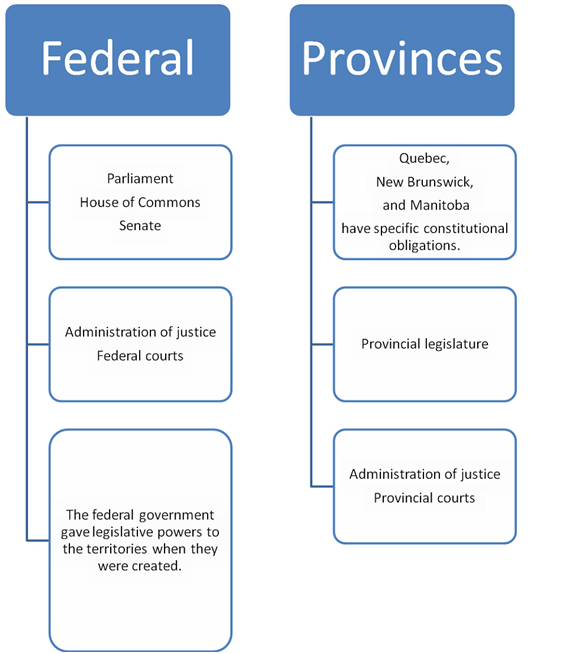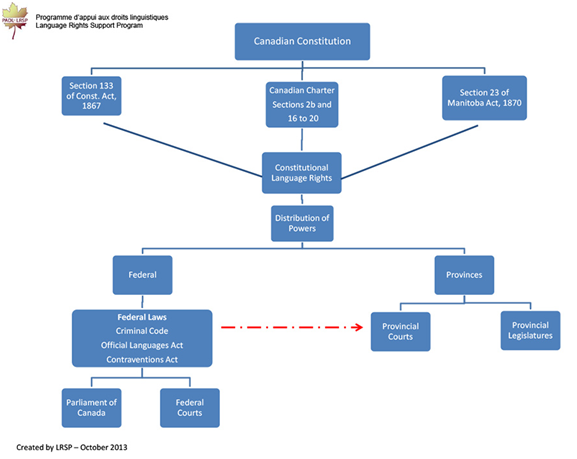Your right is enshrined in the Canadian Charter of Rights and Freedoms (Charter), the Constitution Act of 1867 and the Manitoba Act of 1870.
What is a legislative right?
A legislative right is one that pertains to activities related to lawmaking, such as debates in Parliament and legislative assemblies, minutes of proceedings, newspapers, the texts of laws and the drafting of laws.
Constitutional language rights in the legislative field are written in:
- Section 133 of the Constitution Act of 1867
- Section 23 of the Manitoba Act of 1870
- Sections 2, 17 and 18 of the Charter.
What is the Canadian Constitution?
The Canadian Constitution is the supreme law of Canada. All laws passed by the federal government, the provinces and the territories must respect the obligations and powers that the Constitution confers on them. Unlike many countries that have a single constitutional document, such as the United States, Canada has a constitution made up of a number of written and unwritten elements.
The unwritten elements are principles confirmed by decisions of the Supreme Court of Canada. For example, the unwritten principle of the protection of minorities, set out in the Reference re Secession of Quebec, is a legal process that answered questions of rights arising out of the possible secession of Québec.
What effect do unwritten principles have?
Unwritten principles influence the interpretation of legal documents that may affect language rights. This means that the effect of a legal document on minorities must be taken into account in determining its meaning and scope.
Unwritten principles are constitutional principles expressed by the Supreme Court of Canada and implied in written constitutional documents.
Written and unwritten elements are said to be constitutional. Chief among the written elements are the following documents:
- the Constitution Act, 1867
- the Manitoba Act, 1870
- the Canadian Charter of Rights and Freedoms
- treaties.
Note: For a treaty to be considered a constitutional document, it must be recognized and confirmed. See section 35 of the Charter on this subject. For example, the Supreme Court of Canada has the power to recognize and confirm a treaty.
The Constitution Act, 1867, formerly known as the British North America Act, is one of the written elements of the Constitution. Constitutional documents set out the powers, rights, and obligations of individuals and governments. Some sections of these documents set out constitutional language rights that the federal government and the provincial and territorial governments must respect in their respective fields of jurisdiction. This means that not all governments have the same obligations.
The constitutional obligations of governments with respect to official languages essentially deal with rights in four areas:
- legislation;
- justice;
- communications and services; and
- education.
What constitutional documents guarantee rights in the judicial area?
In 1867, Canada was created by the British North America Act, now known as the Constitution Act, 1867. Section 133 of this act guarantees rights in the legislative and judicial areas to Canadian citizens and inhabitants of Québec.
In 1870, the Manitoba Act gave legal status to the province of that name and guaranteed legislative and judicial language rights to its inhabitants.
Then, in 1982, the adoption of the Canadian Charter of Rights and Freedoms guaranteed a number of language rights to the Canadian public, to Canadian citizens as well as to official language communities as stated in Sections 16 to 23 of the Charter. Furthermore, the Charter guarantees constitutional language rights to New Brunswick inhabitants and official language communities in these four areas: legislative, judicial, education and communications and services

